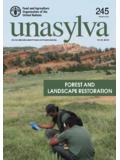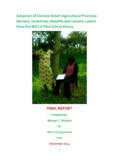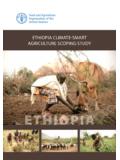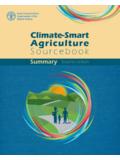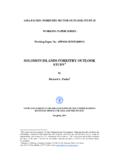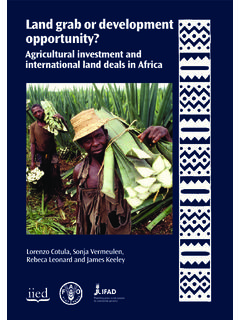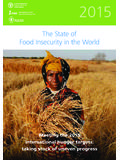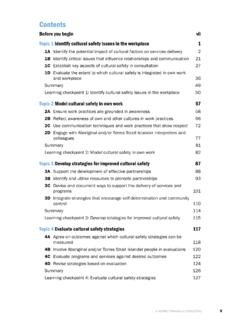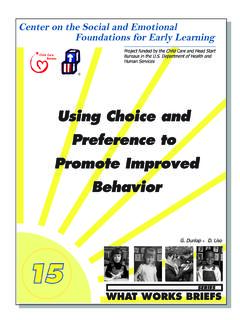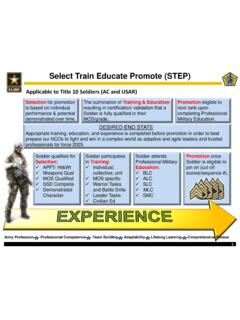Transcription of Enabling extension and advisory services to promote ...
1 Nosim KalandarovEnabling extension and advisory services to promote agroecologyWhy should extension and advisory services promote agroecology? The global impacts of the climate crisis are becoming ever clearer, and natural resources and ecosystems are being depleted. Despite some progress, hunger and poverty persist, and inequalities are deepening. The world is realizing that unsustainable high external inputs and resource-intensive industrialized systems pose a real danger of biodiversity loss, increased greenhouse gas emissions, shortages of healthy food, and the impoverishment of dispossessed peasants around the world. There is global consensus on the urgent need for a transition to agri-food systems that ensure food and nutrition security, social and economic equity, and sustain the ecosystem on which all these elements depend.
2 Agroecology provides a crucial pathway towards this objective. Making extension and advisory services (EAS) demand-driven is not an end in itself but a means to improving their relevance and impact. Optimizing the ecology of the food systemAgroecology consists of principles and concepts designed to optimize interactions between plants, animals, humans and the environment, cognizant of the socio-economic aspects required for a sustainable and fair agri-food system. It posits a comprehensive system centred on smallholder and family farmers (including fisher folk and pastoralists), building on their collective knowledge to identify problems, innovate for specific ecological and cultural contexts and develop long-term solutions for transformational change. Agroecological transition simultaneously addresses climate change adaptation and mitigation, works towards decent rural employment, creates opportunities for rural women and youth, and responds to growing public demand for diversified healthy food, thus helping to address persistent malnutrition.
3 It also promotes different levels of governance and an inclusive and Agriculture Organization of the United Nations (FAO) member nations have agreed on ten interdependent and interconnected Elements of Agroecology: diversity; synergies; efficiency; resilience; recycling; co-creation and sharing of knowledge; human and social values; culture and food traditions; responsible governance; and circular and solidarity economy. Agroecological principles contribute ecologically, economically, and socially to achieving multiple Sustainable Development Goals (SDGs), especially No Poverty (SDG 1), Zero Hunger (SDG 2) and Life on Land (SDG 15).EAS providers can play a key role in this transition. To this end, beyond acquiring new technical and functional skills, they need to undergo a paradigm shift to transcend the narrow narrative of increasing food production and commercialization, while prioritizing the experience and knowledge of rural producers and agroecosystemic extension and advisory servicesWhat does this look like in practice?
4 EAS providers adopt a territorial approach, provide wide-ranging advice on agroecological practices, bridge modern science and practice with traditional and local knowledge, and promote horizontal exchanges that empower producers to co-create knowledge and identify locally derived and appropriate solutions. This leads to integrative farmer-led and community-led extension support programs. Diversified farming systems contribute to the achievement of food sovereignty, social and economic equity, and environmental it happenChanging the EAS paradigm Adopt the ten Elements of Agroecology as your philosophy. Adopt a holistic approach, including sustainable livelihoods, market access, environmental protection and social inclusion, rather than measuring success only in terms of productivity, single commodities and market prices.
5 Move from linear technology transfer and one-size-fits-all approaches towards co-creation and sharing of knowledge, as well as practices adapted to and derived from local conditions. Agroecology is knowledge-intensive and builds on local, traditional and indigenous knowledge, as well as modern multi-disciplinary science. Prioritize producers, and empower them to experiment, exchange and innovate in developing appropriate solutions. All producers, including women, youth, migrants, indigenous people and other vulnerable groups need to participate in the design of extension advisory services focused on agroecology, thus paving the way for participatory farmer-to-farmer approaches, involving farmer leaders, community-based organizations etc. Transform your relationship with the territory towards respectful symbiosis and co-production rather than exploitation.
6 Learning from indigenous and traditional approaches is essential. Empower producers to gain autonomy from credit, inputs and markets. While access to these remains key, agroecology facilitates sustainable production using available on-farm resources and surrounding ecosystems, without over-reliance on unpredictable external factors. Partner with a broad range of stakeholders. Agroecology requires diverse expertise, and thus involves diverse ministries and organizations ( in charge of environment, social affairs, markets, civil society and grassroots organizations, associations of women, indigenous peoples, etc.)ExampleOne of Turkey s many Alternative Food Networks is SAKUDA, a growing network of smallholder farmers, bakers and artisans producing food in Sakarya. The group has promoted sound agroecological practices and high-quality produce.
7 Its priority is to help those who already produce agroecologically to reach alternative markets. It has generated support and solidarity amongst member producers, facilitating market access and agroecological knowledge transfer. The group also operates a self-regulated guarantee for consumers around the forms of farm production. Small producers thus no longer have to await expensive and long certification. Strong links exist between consumers and producers, as well as amongst the producers themselves. FAO FAOE xampleLa Via Campesina established agroecology training schools and/or peasant universities in many countries, as well as regional ones in Latin America and Asia. They provide technical and advocacy training and aim to develop knowledge and broaden people s participation in political, social and cultural life.
8 They adopt a popular education approach, in which new knowledge based on people s experience on the ground is created and shared; a process that also acknowledges the multiplicity of knowledge and social and human diversity . FAO presents scientific evidence, statistical data, best practices and innovations through the Agroecology Knowledge Hub a living lab repository open to everyone. The platform provides specific discussion forums that support the adoption of agroecological extension and advisory services to promote agroecologyCreating an Enabling environment for agroecology Advocate for evidence-based policies, which promote agroecology by supporting territorial approaches, governance at landscape scale, and diversification, while factoring in the external costs and benefits of ecosystems such as biodiversity conservation and restoration.
9 Advocate against investment schemes, which promote high-input, resource-intensive farming systems. Provide information on the situation on the ground and on producers needs and challenges. promote the Tool for Agroecology Performance Evaluation (TAPE), developed by FAO and partners to present evidence and entry points for agroecology s contribution to achieving the SDGs. Act to move agroecology up the research agenda and promote it in agricultural education curricula. Include training programmes on agroecology for EAS and institutionalize the co-creation of multistakeholder approaches (innovation and community-based platforms, farmer field schools (FFS), science-technology backyards etc). Seek to adjust sanitary and phytosanitary measures. Agroecologically produced food can be more diverse, healthier and more nutritious but formal food safety requirements can be challenging for smallholders.
10 EAS can support risk assessment and control systems and help actors devise solutions. Empower producers and their organizations (including associations of women and indigenous peoples) to engage in policy processes and innovative markets, including value addition. Invest in the co-creation and sharing of local, traditional knowledge, by creating innovation and knowledge sharing platforms. Mobilize funds towards community level. Agroecology can also interest new type of donors from environmental and climate sectors, or working with indigenous peoples etc. Engage the private ! Apart from technical skills, EAS also require adopting facilitation and communication skills to empower producers, value their knowledge and facilitate exchange, rather than simply teaching roles and services Provide advice on agroecological practices.
